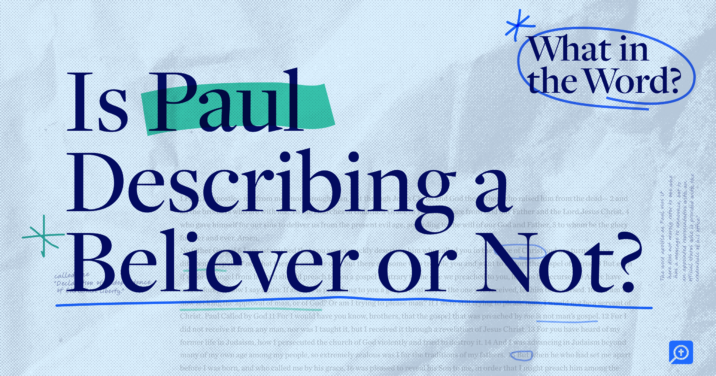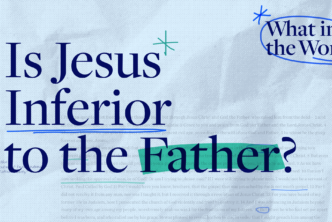Does Romans 7 describe the experience of a believer struggling with sin, or is Paul referring to something else entirely? Many in Protestant traditions assume that Paul’s use of “I” in this passage reflects the believer’s ongoing struggle with sin. But others challenge this view with strong exegetical arguments.
In this episode of What in the Word?, host Kirk E. Miller is joined by Joseph (Joey) R. Dodson, Craig L. Blomberg Endowed Chair of New Testament at Denver Seminary, to explore one of the most debated passages in the New Testament: Romans 7:7–25. Together, Kirk and Joey examine key interpretive questions, compare different viewpoints, and discuss how Romans 7 fits into the broader context of Paul’s argument in Romans 6–8.
Follow the show on YouTube, Spotify, Apple Podcasts, and more.
What you’ll find
Special offers

A Free Book Just for You
Logos has given away over 5 million free books, empowering Christians globally to study deeply. Get a shiny, new free book every month!
Claim your free book

Exclusive Lexham Press Tough Texts Bundle
Have more questions about the Bible? Get the 10-volume Lexham Press Tough Texts Bundle designed exclusively for fans of What in the Word?
Get the bundle

The Future of Bible Study is Here
Unlock in-depth study of God’s Word, plus exclusive discounts, free books, and more starting as low as $9.99/month—only with the new Logos.
Start a free trial
Connect with us
Ready to increase biblical literacy? Like and share. To go the extra mile, leave us a review on your preferred platform.
Subscribe to get future episodes. (Bonus: We’ll send you a discount to use on your first purchase.)
Thanks for subscribing to Word by Word!
Use code WORDBYWORD to save 10% on your first order.
Episode guest: Joseph Dodson
Joseph (Joey) R. Dodson is the Craig L. Blomberg Endowed Chair of New Testament at Denver Seminary, a religious studies professor at Purdue University, and a pastor at New Denver Church. Joey studied at the University of Aberdeen in Scotland and then went on to the University of Tübingen in Germany. His most recent book is Conquerors Not Captives: Reframing Romans 7 for the Christian Life. Joey brings years of scholarly experience and pastoral engagement, with a focus on the intersection of Second Temple Judaism, early Christianity, and Greco-Roman philosophy.
An avid hiker, Joey has climbed countless mountains around the world—including two-thirds of “the 14ers” in the contiguous US, as well as a “17er” in Peru. More importantly, Joey married his elementary school sweetheart, Sadie. They have been married now for thirty years. Joey and Sadie have five children, a son-in-law, a daughter-in-law, and the greatest granddaughter and two grandsons in the entire multiverse.
Episode synopsis
Who is the “I” in Romans 7:7–25?
Interpretive controversy exists over Paul’s use of the first-person pronoun “I” in Romans 7:7–25. The core of the debate is this: When Paul says things like, “I do not do what I want, but I do the very thing I hate” (Rom 7:15), whose experience is he describing?
Is this the experience of a believer or non-believer?
How one answers the above question has implications for whether Paul is portraying his post-conversion condition as a Christian struggling with sin, or whether this is the condition of one under the law and not yet transformed by grace. Thus, interpretations fall into either one of two camps:
- The autobiographical view: Paul is describing his own post-conversion struggle with sin.
- The impersonation view: Paul is portraying someone else—possibly Israel, Adam, or a generic person under the law.
Joey’s view aligns with the latter: He believes Paul is impersonating a person under the law who is not yet a believer empowered by the Spirit.
Historical interpretations: Augustine to the Reformers
Joey walks through some history of interpretation, noting that earlier church fathers like Origen did not see Romans 7 as autobiographical. Origen, a native Greek speaker, argued that Paul was doing prosopopoeia—a rhetorical impersonation.
Augustine initially held this view, but later changed his interpretation in response to Pelagianism, using Romans 7 to stress the ongoing struggle with sin.
The Reformers, especially Luther and Calvin, amplified this latter view. They read Romans 7 as a depiction of the believer’s daily battle with sin. This interpretation has shaped much of Protestant theology for centuries.
Impersonation views: Adam, Israel, or legalist
Joey outlines several various impersonation views:
- Adam: Paul speaks from the perspective of Adam, the first person to sin upon receiving a commandment (see especially Rom 7:7–11). We also recall that Romans 5 has already spoken of Adam.
- Israel: Paul embodies Israel’s tragic experience under the law as recorded throughout the Old Testament.
- A generic person under the law: Paul adopts the voice of any human bound by law but without the Spirit.
Each view stresses the impotence caused by trying to keep the law without God’s transformative grace.
Setting the stage: the context of Romans 5–8
As one explores the above interpretive options, Joey and Kirk encourage listeners to consider the flow of thought from Romans 5 through Romans 8.
In Romans 5, Paul lays out the blessings of justification—peace with God, joy in suffering, and hope rooted in divine love. Romans 6 underscores that believers are dead to sin and alive to God, having been united with Christ in death and resurrection. Romans 7, then, sits in the middle of an arc, serving as a hinge: While chapter 6 asserts freedom from sin and chapter 8 celebrates life in the Spirit, Romans 7 takes a step back to examine the law’s role in human sinfulness.
As we’ve seen, Paul’s argument in Romans 5–8 is deeply structured, and this broader structure must be accounted for when we interpret the particulars of Romans 7:7–25.
Rhetorical techniques & imagery in Romans 6–8
Kirk and Joey observe how Paul uses rhetorical questions to structure his argument throughout the book of Romans—Romans 6–8 being no exception (Rom 6:1–3, 15–16; 7:1, 7, and 13; see also 6:21 and 7:24). Such questions are a common device in Greco-Roman diatribe.
Kirk and Joey also observe how, along with these rhetorical markers, Paul employs varied imagery to convey a unified thought. Three key metaphors emerge in Romans 6:1–7:6:
- Baptism: Dying to the power of sin and resurrection to new life in union with Christ’s own death and resurrection (roughly Rom 6:1–14).
- Slavery: Release from our slavery to sin and, after receiving a new master, becoming slaves to righteousness (roughly Rom 6:15–23)
- Marriage: Dying to the law, becoming a widower to it, and belonging to a new “husband,” Christ (Rom 7:1–6)
Each of these images seem to be different ways to speak about the same change in status. Thus, when Paul speaks of believer having “died to the law” in Romans 7:4, this is coextensive with their having died to sin in Romans 6:1–14. Likewise, his depiction of believers having been “released from the law” in Romans 7:6 overlaps with their release from sin’s bondage in Romans 6:15–23.
This suggests that Paul’s immediately following description in Romans 7:7–25, detailing experience under the law, stands in contrast to the believer’s current state, as portrayed in Romans 6.
The programatic role of Romans 7:4–6
Further, Romans 7:5–6 outlines Paul’s two broad movements in what follows. First, he summarizes life under the law as animated by the flesh (Rom 7:5), which he’ll unpack in Romans 7:7–25. This he contrasts with life in the new covenant, defined by the Spirit’s work in our lives (7:6), which he’ll pick up in Romans 8:1.1
|
Life under the law in the flesh (7:5) |
Life in the Spirit (7:6) |
|
Life under the law in the flesh elaborated (7:7–25) | Life in the Spirit elaborated (8:1–17) |
Why Romans 7 doesn’t depict the Christian life
Joey goes on to challenge the autobiographical view on several fronts:
- Contradiction with Romans 6 and 8: In Romans 6, Paul insists believers are no longer slaves to sin, and in Romans 8 they are empowered by the Spirit. Romans 7’s language of bondage and defeat doesn’t align with this.
- Absence of the Holy Spirit: From Romans 7:7 onward, the Spirit is noticeably absent. By contrast, Romans 8 overflows with Spirit-filled empowerment.
- “Sin dwelling in me” (7:17): For Joey, this language is incompatible with Paul’s teaching that believers are new creations—indwelt not by sin, but by the Holy Spirit.
- Under the law: Romans 7:7–25 depicts the experience of one under the Mosaic law. But arguably, Paul does not see the believer as under the Mosaic law, but under “grace,” i.e., the new covenant.
Thus, throughout Romans 6:1–8:17, Paul makes stark contrasts between our former and new conditions. Comparing these descriptions, we find that Paul’s language in Romans 7:7–25 matches what he says elsewhere in Romans 6–8 to describe the pre-conversion state and is at odds with the believers’s new state.
| The state of the non-believer | The state of the believer |
|
Alive to sin (Rom 7:9; 23, 25) |
Dead to sin, alive to God (Rom 6:2, 11) |
|
Slave to sin (Rom 6:6, 16–20, 22; 7:14) |
Slave to righteousness (Rom 6:7, 16–19, 22) |
|
Old self/humanity (Rom 6:6) | New self/humanity (compare Eph 2:15; Col 3:9–11; Eph 4:22–24) |
|
Under the law (old covenant; Rom 6:14, 15; 7:4–6; 8:3) |
Under grace (new covenant; Rom 6:4, 14, 15; 7:6) |
|
Animated by the flesh (7:5; 7:14, 18, 25; 8:3–8, 12–13) |
Animated by the Spirit (7:6; 8:2, 4–6, 9-11, 13–15) |
|
Resulting in lawlessness & death (Rom 6:16, 19, 21, 23; 7:5, 8–11, 13; 8:6, 13) |
Resulting in sanctification & eternal life (Rom 6:16, 19, 22–23; 7:4; 8:6, 10–11, 13) |
What about the switch to the present tense (7:14)?
Many who interpret Romans 7 as autobiographical, and thus indicative of the believer, point to Paul’s shift to the present tense in verse 14. Joey, however, argues, based on verbal aspect theory, that this form in the Greek doesn’t always indicate present tense. Rather, it is often used rhetorically to intensify the discourse.
Thus, the “present tense” in Romans 7 doesn’t necessarily indicate Paul is describing his current Christian life. Instead, it could be a literary strategy to animate the voice of the persona whom Paul is impersonating.
The Identity of the “wretched man” (7:24)
One of the emotional peaks of Romans 7 is the cry, “Wretched man that I am! Who will deliver me from this body of death?” For Dodson, this isn’t a Christian lament—it’s a cry of someone under the law, desperate for salvation. The answer comes in Romans 8:1: “There is therefore now no condemnation for those who are in Christ Jesus.” Romans 8:1 signifies a shift from the hopelessness of life under law (Rom 7:7–25) to the liberation found in life through the Spirit (Rom 8).
Paul’s emphasis: the goodness yet impotence of the law
A central theme in Romans 7 is the law’s inability to produce righteousness. Joey notes that Paul defends the law as “holy, righteous, and good” (7:12), but insists it was weakened by the flesh. The law reveals sin but cannot conquer it.
This diagnosis sets the stage for Romans 8, where the Spirit accomplishes what the law could not.
Tips for preachers & teachers
The episode offers several recommendations for those preaching or teaching on this passage:
- Avoid “narcigesis” (narcissistic exegesis): Don’t read personal experience into the text. Let the text shape understanding.
- Emphasize the Spirit: Romans 7 is meant to show the futility of life without the Spirit. Romans 8 offers the resolution.
- Stress the importance of community: Notably, the speaker in Romans 7:7–25 describes himself in the singular, “I” not “we.” The Christian life and the fight with sin is meant to take place in community.
From captives to conquerors!
Joey argues that misreading Romans 7 can give rise to a defeatist Christianity. If believers assume Paul is teaching that persistent defeat is normal, they may fail to grasp the power available to them in Christ. Rather than interpreting the Christian life through the lens of Romans 7, we should interpret Romans 7 through the lens of what Romans 6 and 8 clearly teach about the believer’s new life and freedom from sin.
This perspective doesn’t deny the reality of temptation or the need for grace. Instead, it calls believers to a higher vision—one rooted in freedom, community, and the transforming power of the Spirit. Romans 7 shows captivity under the law. But believers are not called to remain there. Through the Spirit, they become more than conquerors.
Logos values thoughtful and engaging discussions on important biblical topics. However, the views and interpretations presented in this episode are those of the individuals speaking and do not necessarily reflect the official position of Logos. We recognize that Christians may hold different perspectives on this passage, and we welcome diverse engagement and respectful dialogue.
Joseph’s recommended resources for further study
- “Is This Sinful?”: How to Know Whether Something Is a Sin
- What Is Exegesis & Why Is It Important? Plus, How to Start
- Life Together, Confession Together: Why Churches Need Corporate Confession
- A Guide for Spiritual Renewal through Confession
- No Longer Captives: Released from the Cage of Romans 7
- The below chart is based on Thomas R. Schreiner’s in Romans, eds. Robert W. Yarbrough and Joshua W. Jipp, Baker Exegetical Commentary on the New Testament, 2nd ed. (Baker Academic, 2018), 378.






